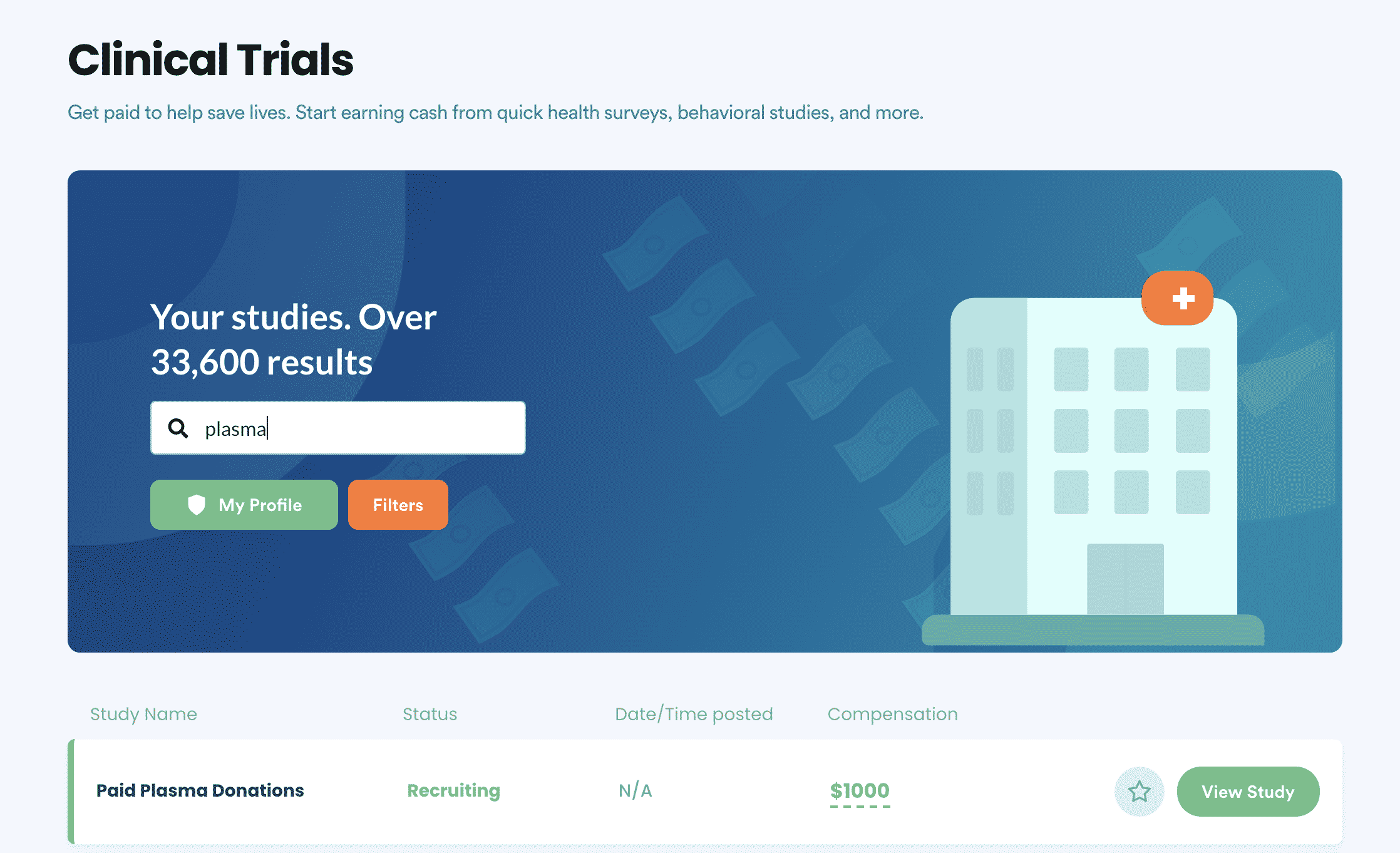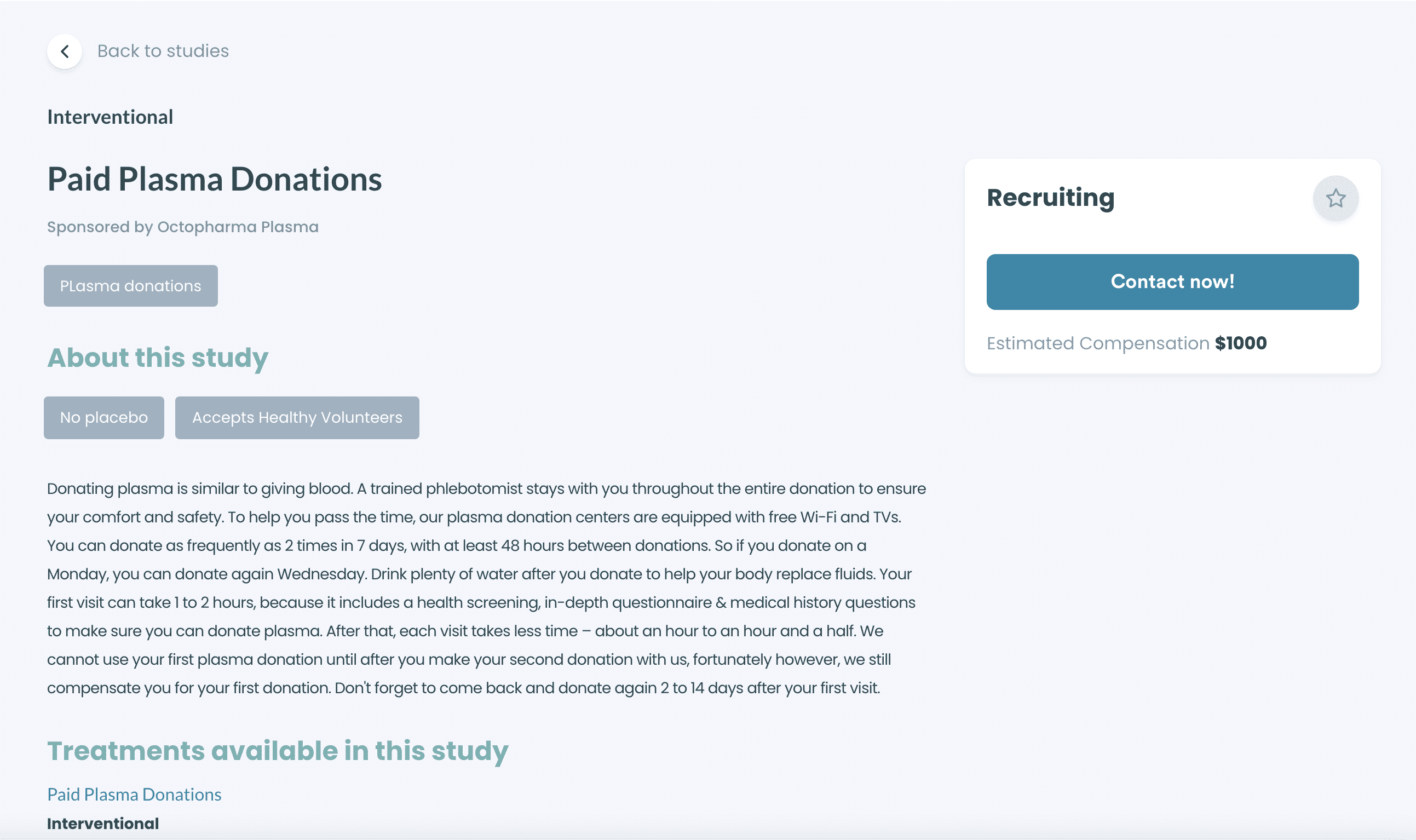Best Places For Plasma Donation In Sioux Falls
Who says you have to be a multi-billionaire vigilante or bitten by a radioactive spider to be a hero? You can make a difference in the lives of people suffering from chronic diseases, burns, trauma, and shock by donating some of your plasma. It is a sanitary and safe process, with local and federal safety mandates upheld at all the country's plasma donation centers.
The Plasma Protein Therapeutics Association, Americans exceeding 125,000 in number, and their friends and family need these plasma donations each year. Here at DoNotPay, we know you want to help, and that's why we're dedicated to helping you find the closest . Additionally, we'll also guide you on the donation process and eligibility criteria so that you'll know what to expect.
What is Plasma and Why Donate?
Plasma is the liquid part of blood; about 55% of all your blood is plasma. The 45% that's left consists of platelets, red blood cells, and white blood cells that are suspended within the plasma. In itself, plasma is 92% water, 7% crucial proteins like gamma globulin, albumin, and the anti-hemophilic factor, and the remaining 1% - sugars, mineral salts, vitamins, fats, and hormones.
Functions of Plasma in the Human Body
These are the reasons why your anatomy needs and therefore generates plasma:
- Supplies vital proteins to sustain immunity and enable blood clotting
- It maintains blood volume and pressure
- It feeds our muscles electrolytes like potassium and sodium
- It supports cell function by maintaining the body's required pH balance
What Is Your Donated Plasma Used For?
Blood and plasma donation are activities necessary in the saving of human lives. For people with rare diseases, these plasma therapies are a literal lifeline. Just look at some of the plasma protein therapies created from your source plasma:
- Clotting agents – Survivors of bleeding diseases or disorders have their problems arising from their blood's inability to properly clot. Plasma treatments help improve their condition as a minor injury can result in organ damage, internal bleeding, or death.
- Albumin – This plasma protein is used to heal burns, treat trauma, and revitalize surgical patients.
- Immunoglobulin (IVIG) – Did you know there are over 150 primary immunodeficiency disorders (PID)? The people living with these conditions are constantly exposed to frequent serious infections because of their malfunctioning immune systems. The protein IVIG helps these people fight for their lives and live longer.
- Alpha-1 Antitrypsin Deficiency – Your plasma proteins help with this inherited type of emphysema. This heredity disorder is characterized by lung disease in adults and liver and/or lung disease in both adults and kids.
- Hyperimmune globulins – These immune globulin preparations are rich in antibodies and provide protection against diseases such as rabies and tetanus, granting the recipient some form of passive immunity. They're also used to treat organ transplant recipients, dialysis patients, and Rh-incompatible pregnant women.
What Are the Eligibility Requirements of a Plasma Donor?
Changing strangers' lives one plasma donation at a time is admirable, to say the least. However, to safeguard the safety and good health of both the donor and the recipient, the following requirements need to be met:
- One should be at least 18 years old
- They should weigh 110 pounds (around 50 kilograms) or more
- Has valid identification details, such as a permanent address and photo ID
- Successfully cleared a basic physical exam
- Passes health screening, a blood test, and a viral test
- Successfully completes screening on their medical history
It is worth noting that depending on the site you use, the eligibility requirements may vary.
Where Can I Donate Plasma in Sioux Falls
If you live in Sioux Falls, South Dakota, it's understandable you'd want to donate somewhere close to home. You don't want to take a 30-minute bus ride and then walk for a few minutes more before and after the procedure. Below are a few plasma donation centers that are just around your corner:
| Plasma Donation Center | Phone Number | Physical Address |
| Talecris Plasma Resources | (605) 271-6090 | 1025 N Minnesota Ave
Sioux Falls, SD 57104 |
| Community Blood Bank | (605) 322-7111 | 1100 E 21st St
Sioux Falls, SD 57105 |
| Avera McKennan Blood Bank | (605) 322-7111 | 1301 S Cliff Ave Plaza 2 3rd Floor
Sioux Falls, SD 57105 |
| Omegaquant Analytics | (605) 271-6917 | 5009 W 12th St Ste 8
Sioux Falls, SD 57106 |
| American Red Cross | (605) 336-2448 | 2925 E 57th St
Sioux Falls, SD 57108 |
How Much Do You Get Paid for Plasma Donation?
The amount of money you can make from donating plasma depends on several factors, the first being the frequency. Plasma donation is restricted to once every 28 days by the American Red Cross. However, private centers let you donate twice a week according to U.S FDA regulations. There should be a 48-hour gap between donations.
Weight is also another factor that comes into play when it comes to how much you'll make. Usually, the more you weigh, the greater the plasma content you can donate. At most centers, payment is usually between $50 and $75 per appointment.
First-time donors typically get hefty bonuses for their donations. CSL Plasma, one of the world's leading plasma collection companies, has new donors making over $1,000 during the first month. After one's appointment, the funds are wired to one's prepaid debit card.
Things to Keep in Mind
There are a lot of considerations to be made when donating any organ or fluid from one's body. We've highlighted some of the more pressing queries from donors and aspiring donors.
-
How Long Does It Take To Donate Plasma?
The time it takes to donate your plasma varies by location. The first donation you'll ever make takes between 2 and 2.5 hours to complete (it includes a health assessment as well). Subsequent appointments usually take around 1.5 hours (90 minutes).
-
Can Diabetics Donate Plasma?
Most doctors and medical bodies agree that diabetics can donate their plasma as long as they feel healthy and the condition is well under control. People who have a hard time keeping their blood sugar within the required range should talk to their doctor if they want to donate.
-
Can You Donate Plasma After Getting a COVID Jab?
Covid-19 has affected plasma donation in a big way. Individuals who've recovered from coronavirus are eligible to donate 14 days after their symptoms have entirely dissipated. It is required one wait seven days after their Covid-19 vaccination before they can donate plasma.
How to Donate Plasma on Your Own in Sioux Falls
The first step is to look for . Choose a center that's preferably near your place of residence. Several organizations are involved in the collection of plasma, some of which include the American Red Cross group, CSL Plasma, the Plasma Protein Therapeutics Association (PPTA), and thplasma.
You can search for a donation center near you on the websites by using your zip code. After identifying the particular location, make sure to check on the various eligibility requirements before making your visit. This includes forms of identification, proof of one's social security number, and/or proof of residency.
After the staff is satisfied you're who you say you are, they'll ask you a few questions. Prepare yourself to answer questions concerning your medical history and to have a physical examination conducted on you. Once all the criteria have been met, you can begin the plasma donation process. Once you're done, compensation will be transferred to your reloadable prepaid debit card.
Donating Plasma in Sioux Falls With DoNotPay
It's not easy identifying the best plasma donation site near you, especially if you do not have intimate knowledge concerning this industry. Furthermore, there are considerations you should have in mind going in, like the compensation estimates, the requirements to be met by an eligible donor, and the ins and outs of the donation process.
DoNotPay (DNP) will help you with all this, plus we'll contact the best center for you beforehand to try and answer any questions and alleviate any concerns. You don't have to go through the frustrating DIY route when we have all the solutions here at DNP.
Here's how you can use DoNotPay to become a plasma donor:
- Search "plasma donations" on DoNotPay and find the nearest donation clinic through our clinical trials product.

- Select the "Contact Now" button to learn more about eligibility criteria, contact the clinic with questions, or sign up for first-time donor bonuses.

- Verify your information and submit your inquiry! DoNotPay will contact the clinic on your behalf and make sure your questions get answered.

Why Use DoNotPay?
Donating plasma to people who need it is crucial work. Your generosity keeps the wheel of medical advancement rolling, and with it comes a lot of smiling faces and hearts full of gratitude. Don't let the rigors of jumping through the procedural hurdles put you off.
At DoNotPay, we understand you're literally giving a part of yourself to save others, and it's why we're dedicated to making the process as easy and straightforward as possible. Don't comb through hours of web pages looking for a comfortable solution. You already have that with us. Reach out to us and let's see what we can do together.


